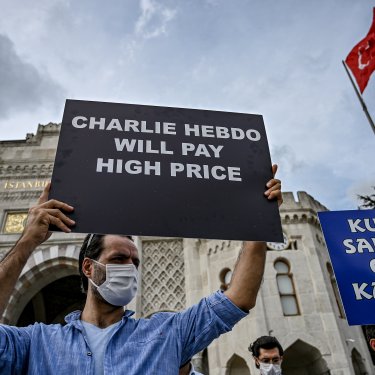Charlie Hebdo: “You marched for free speech in 2015, ensure it is respected now”

After the violent reactions and threats following the French satirical weekly Charlie Hebdo’s decision to republish the Mohamed cartoons on its cover, Reporters Without Borders (RSF) appeals to world leaders who took part in the historic march in Paris in January 2015 to respond again now to avoid a new tragedy.
Calls for violence, condemnation by senior religious dignitaries and demonstrations in which protesters have trampled on the French flag – such have been the reactions in various parts of the world to the republishing of the cartoons to coincide with the start of the trial (September 2, 2020) of those accused of complicity in the 2015 Charlie Hebdo shootings. These reactions pose a new threat to the weekly.
RSF appeals to all the world leaders who participated in the historic march in Paris on 11 January 2015, or to their successors, to ensure that issues related to religious intolerance are included in legislative and prescriptive initiatives and international actions for the protection of journalists. This means decriminalizing “blasphemy” in all UN member states.
“There is an urgent need to reconnect with the spirit of tolerance and fraternity that prevailed in the aftermath of the Charlie Hebdo shootings,” RSF Secretary-General Christophe Deloire said. “Respect for international legal standards protecting freedom of expression is not just an obligation. Heads of state and government have a duty to guarantee respect for these standards, obviously, but they also have a responsibility to promote this respect.”
RSF deplores the fact that dangerous statements by some leaders have unfortunately not been sufficiently challenged. Turkey was one of the first countries to react to the republishing of the cartoons that prompted the 2015 terror attacks. The Turkish foreign ministry condemned their publication in a statement, while the government criticized the French president for defending the right to blasphemy.
A few days later, on 8 September, Iran’s Supreme Leader, Ayatollah Ali Khamenei described the republishing of the cartoons as an “unforgiveable great sin” and said, “the pretext of freedom of expression invoked by certain French politicians for not condemning this great crime must be rejected as mistaken and demagogic.” Even if not a formal order, this kind of statement from the country’s highest religious official could be regarded as a fatwa against Charlie Hebdo and its cartoonists.
An adviser to the head of the Chechen Republic, Supreme Mufti Salah Mezhiev, openly threatened Charlie Hebdo on 4 September, describing the republishing of the cartoons as an “attack clearly planned by the West against Islam (...) liable to cause new human victims.” He warned that “the Chechen people and the entire Muslim Umma are determined to deliver a worthy response to the mockery by Satan’s thugs.”
The Al Qaeda organization also openly threatened the staff of Charlie Hebdo. The 2015 attack “was not a one-off incident,” the terrorist organization said in a magazine issue dedicated to the attacks on the World Trade Centre and other US targets in 2001 that it published on 11 September. Al Qaeda accused French President Emmanuel Macron of “having given the green light” for the republishing of the cartoons and issued this warning: “If your freedom of expression respects no limit, prepare to face the freedom of our actions.”
Anti-French protests were held in various Muslim countries. In Pakistan, around 100 people demonstrated on 3 September in Muzaffarabad, the capital of Pakistan-administered Kashmir, chanting “Stop barking, French dogs,” walking on the French flag and then burning it. The following Friday, thousands of people protested throughout Pakistan, especially in Lahore, in response to a call from the extremist party Tehrik-e-Labbaik Pakistan.
In the Turkish city of Istanbul, hundreds of protesters, brandishing placards with the words “Charlie Hebdo and Emmanuel Macron will pay a high price,” demonstrated on 13 September. In Iraq, around 100 people, including women and children, gathered outside the French embassy in Baghdad on September 17 in protest against the republishing of the cartoons.
In Denmark, the Jyllands-Posten daily newspaper, which was the first newspaper to publish the Mohammed cartoons in 2005, paid tribute to Charlie Hebdo but explained that it would no longer take the risk of exposing its staff to violence.
Turkey is ranked 154th out of 180 countries in RSF's 2020 World Press Freedom Index, Pakistan is 145th, Russia is 149th and Iran is 173rd.



